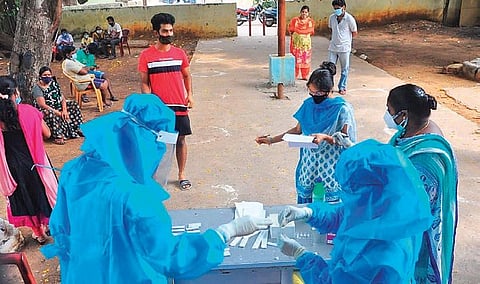N440K variant spreading more in South India, shows study
BENGALURU: As the demand for increasing genome sequencing of SARS-CoV2 is getting louder in the country, a recent study suggests that a particular variant of the novel coronavirus is spreading “a lot more” in the southern states of the country.
Researchers and scientists at the Hyderabad-based Centre for Cellular and Molecular Biology (CSIR-CCMB) analysed more than 5,000 coronavirus variants detected in the country and their evolution over the course of the pandemic.
Aaccording to a press release issued by CSIR-CCMB, the N440K and a few other variants are spreading faster in some states and virus mutation will result in new variants. “A closer surveillance is needed to understand its spread properly.
Accurate and timely detection of new variants that may show greater infectivity or worse clinical symptoms, including immune escape, will be extremely important to preempt disastrous consequences,” CCMB Director Rakesh Mishra stated in the release.
The virus variants -- immune-escape E484K mutation and the N501Y mutation -- that are worrying many countries globally have only a low prevalence in the country so far. “However, their apparent low prevalence might be simply because not enough sequencing has been done.
More coronavirus genomes need to be sequenced across the country to accurately identify the emergence of these and other new variants,” said Dr Mishra, who is also the corresponding author of the study. Epidemiologist Dr Giridhara Babu, who has been an advocate of increased genomic surveillance, agreed.
“We need to be continuously vigilant and ensure that containment measures are very strict in detecting outbreaks early. It is better to track the growth rate of cases, test positivity and watch out for clustering of cases. Some of the identified strains are highly infectious, we need to strengthen surveillance across state,” he said.
Bioethics researcher Anant Bhan said, “With international and domestic travel and social interactions increasing, it is important to keep a watch for new variants through surveillance.”Health and Medical Education Minister Dr K Sudhakar said, “Ten labs for genome sequencing are being set up. Strict vigilance along Maharashtra-Karnataka border has been ordered. Samples are also being sent for genome sequencing.”

